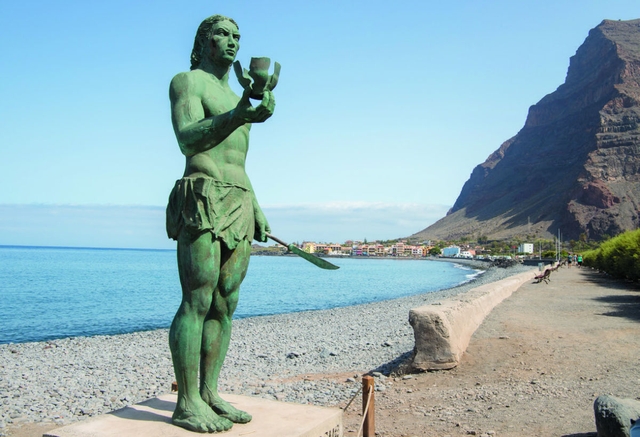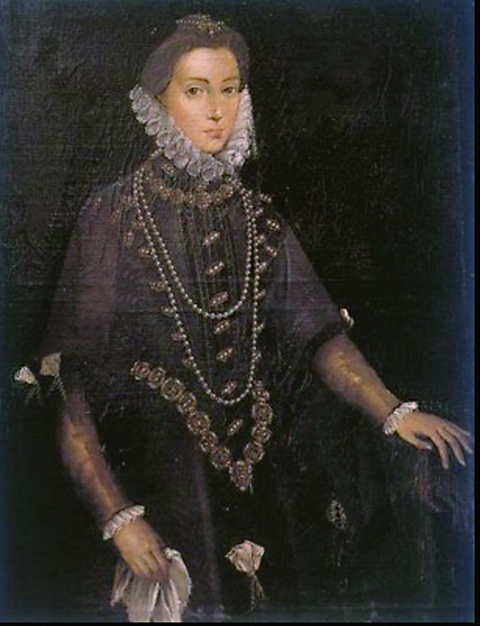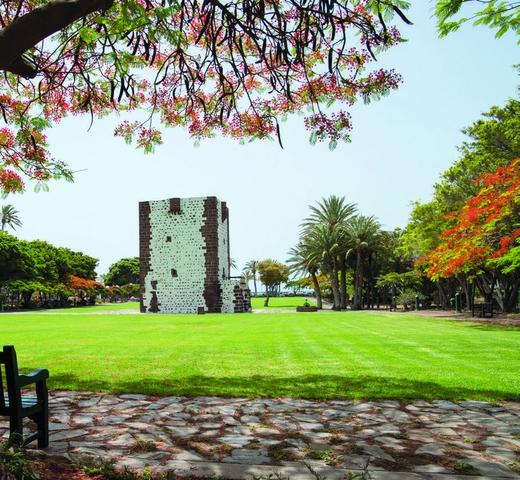DAS DUNKELSTE KAPITEL. Der Aufstand der Gomeraner
Eine der tragischsten und bedeutsamsten Episoden in der Geschichte von La Gomera begann in der Umgebung des Ortes,

Allerdings schien es in einem so dramatischen Gebiet schwierig, die örtliche Bevölkerung mit Waffengewalt zu unterdrücken. Daher beschlossen die Herren, Friedensabkommen mit der lokalen Bevölkerung zu schließen. Die Hinrichtung war die Strafe für das, was die Aborigines auf ihrer Werteskala als unverzeihliches Verbrechen ansahen: den Bruch des Bündnisses der Kolaktation. Eine Regel, die Peraza in den Augen der Ureinwohner gebrochen hatte, indem er fleischliche Beziehungen zu einer Frau unterhielt, die in der Tradition als Iballa bekannt war. Nach der Hinrichtung von Peraza durch den indigenen Anführer Hautacuperche greifen die Indianer den Verteidigungsturm der Stadt San Sebastián an: den Torre del Conde. Dort flüchten die Verteidiger bei Beatriz de Bobadilla.
Während der Belagerung beendet ein Pfeil das Leben von Hautacuperche und die Indianer fliehen in die Berge. Danach bittet Bobadilla Pedro de Vera um Hilfe, den Eroberer und Gouverneur von Gran Canaria, einer Insel, die er erst fünf Jahre zuvor unterworfen hatte. Er kam mit Verstärkung nach La Gomera, entschlossen, den Aufstand niederzuschlagen. Um dies zu erreichen, greift er auf Tricks und Täuschungen zurück: Er ruft die Bevölkerung zur Beerdigung von Hernán Peraza auf und verspricht allen, die zur Verabschiedung seines Herrn kommen und beichten, Vergebung. Diejenigen, die kommen, werden eingesperrt und für alle Männer über 15 Jahren der aufständischen Seite wird die Todesstrafe sowie der Verkauf ihrer Frauen und Kinder als Sklaven verurteilt. Die Unterdrückung ist brutal und hinterlässt unauslöschliche Spuren im Gedächtnis der Gomeraner.
EIN GRUNDLEGENDES KAPITEL IN DER GESCHICHTE DER INSEL
EL CAPÍTULO MÁS OSCURO. LA REBELIÓN DE LOS GOMERANOS
Uno de los episodios más trágicos y relevantes de la historia de La Gomera comenzó en los alrededores del lugar en el

Sin embargo, en un territorio tan dramático, someter a la población local por la fuerza de las armas parecía complicado. Por ello, los señores optaron por llegar a acuerdos de paz con la población local. La ejecución era el castigo por cometer lo que los aborígenes consideraban, en su escala de valores, un crimen imperdonable: la violación del Pacto de Colactación. Una regla que, a los ojos de los aborígenes, Peraza había roto al tener relaciones carnales con una mujer conocida en la tradición como Iballa. Tras la ejecución de Peraza por parte del líder indígena Hautacuperche, los indios asaltan la torre defensiva del pueblo de San Sebastián: la Torre del Conde. Allí, los defensores se refugian en Beatriz de Bobadilla.
Durante el asedio, una flecha acaba con la vida de Hautacuperche, y los indios huyen a las montañas. Posteriormente, Bobadilla pide ayuda a Pedro de Vera, conquistador y gobernador de Gran Canaria, isla que había sometido apenas cinco años antes. Llegó a La Gomera con refuerzos, decidido a sofocar la rebelión. Para conseguirlo recurre a artimañas y engaños: convoca a la población al funeral de Hernán Peraza, y promete perdón a todos aquellos que acudan a la despedida de su señor y se confiesen. Los que vienen son encarcelados y condenados a muerte para todos los hombres mayores de 15 años de los bandos alzados, así como a la venta de sus esposas e hijos como esclavos. La represión es brutal y deja una huella imborrable en la memoria de los gomeros.
UN CAPÍTULO FUNDAMENTAL EN LA HISTORIA DE LA ISLA
THE DARKEST CHAPTER. THE REBELLION OF THE GOMERANS
One of the most tragic and relevant episodes in the history of La Gomera began in the surroundings of the place where you

However, in such an dramatic territory, subduing the local population by force of arms seemed complicated. Therefore, the lords chose to reach peace agreements with the local population. Execution was the punishment for committing what the Aboriginal people considered, on their scale of values, to be an unforgivable crime: the breaking of the Covenant of Colactation. A rule that, in the eyes of the aborigines, Peraza had broken by having carnal relations with a woman known to tradition as Iballa. After the execution of Peraza by the indigenous leader Hautacuperche, the Indians assault the defensive tower of the town of San Sebastián: the Torre del Conde. There, the defenders take refuge with Beatriz de Bobadilla.
During the siege, an arrow ends the life of Hautacuperche, and the Indians flee to the mountains. After that, Bobadilla asks for help from Pedro de Vera, conqueror and Governor of Gran Canaria, an island he had subdued just five years earlier. He came to La Gomera with reinforcements, determined to quell the rebellion. To achieve this, he resorts to trickery and deceit: he summons the population to the funeral of Hernán Peraza, and promises forgiveness to all those who come to his lord’s farewell and confess. Those who come are imprisoned and death is sentenced for all men over 15 years of age from the uprising sides, as well as the sale of their wives and children as slaves. The repression is brutal, and leaves an indelible mark on the memory of the Gomerans.
A FUNDAMENTAL CHAPTER IN THE HISTORY OF THE ISLAND
Translation by IM-Translator
Frage/Pregunta/Question:
"El episodio mas ...." - Wie lautet das letzte Wort?/What is the last word?/¿Cuál es la última palabra?